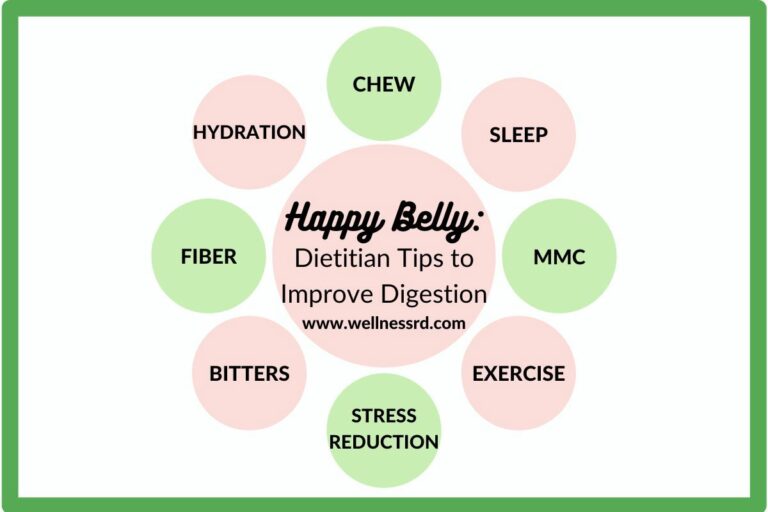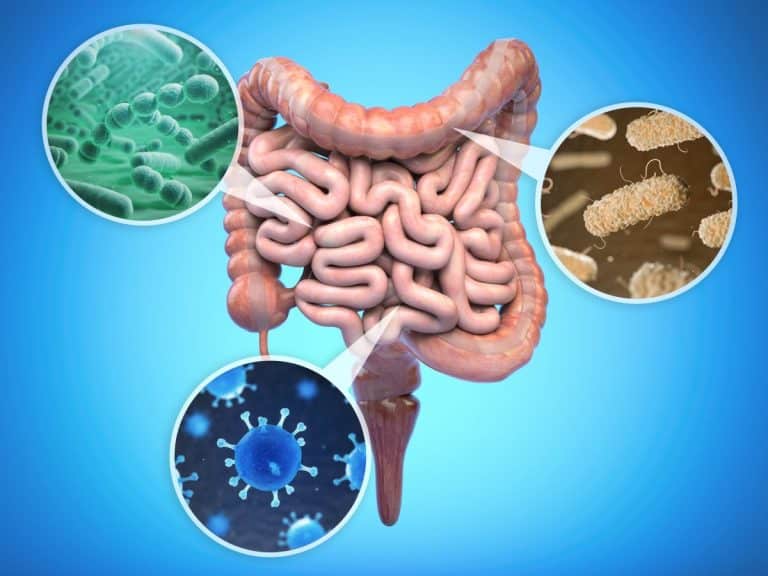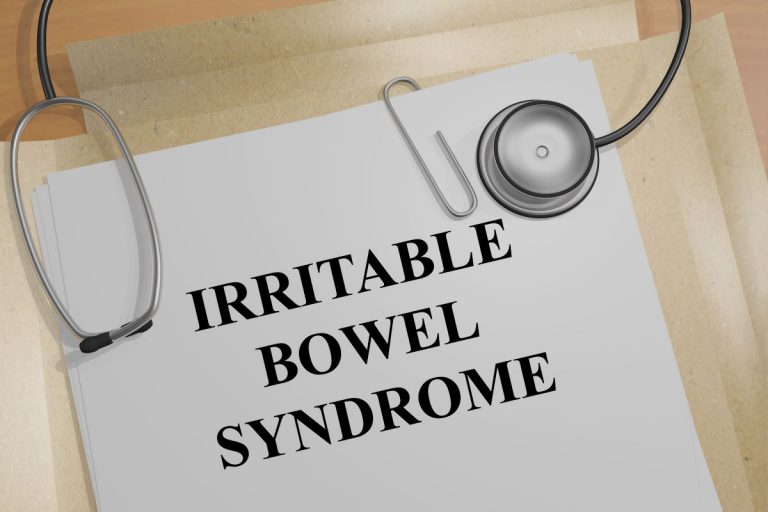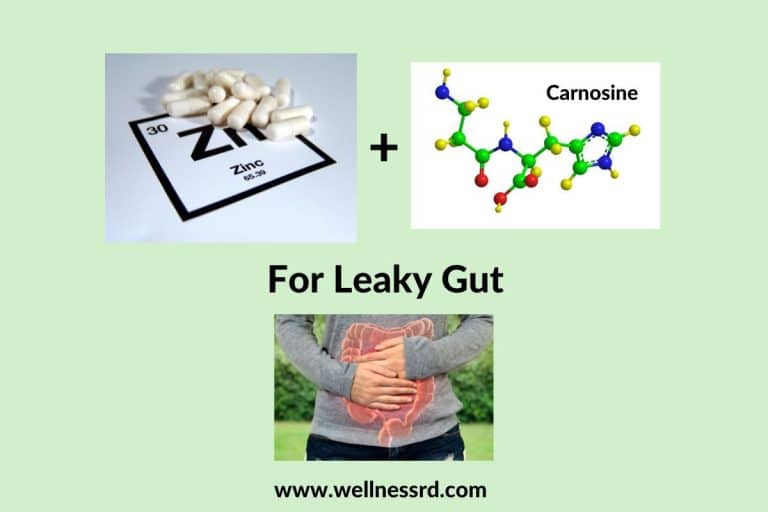Natural Alternatives to PPIs for Reflux: What Does Research Say?
Are you looking for natural alternatives to PPIs (proton pump inhibitors) for reflux symptoms?
Wonder if natural alternatives to PPIs are helpful?
We understand! There are many natural solutions for reflux on the market.
What foods should you eat, and which foods should you avoid with reflux?
What supplements are natural alternatives to relieve reflux symptoms? Are there any lifestyle changes that might help you feel better?
This article contains science backed suggestions for natural alternatives for reflux that will help you overcome your symptoms.
This information is for educational purposes only. As with any medical advice, always check with your doctor or healthcare professional for personal and age-appropriate recommendations.
Let’s get started.
Want a copy of this article? Click here to download a copy.
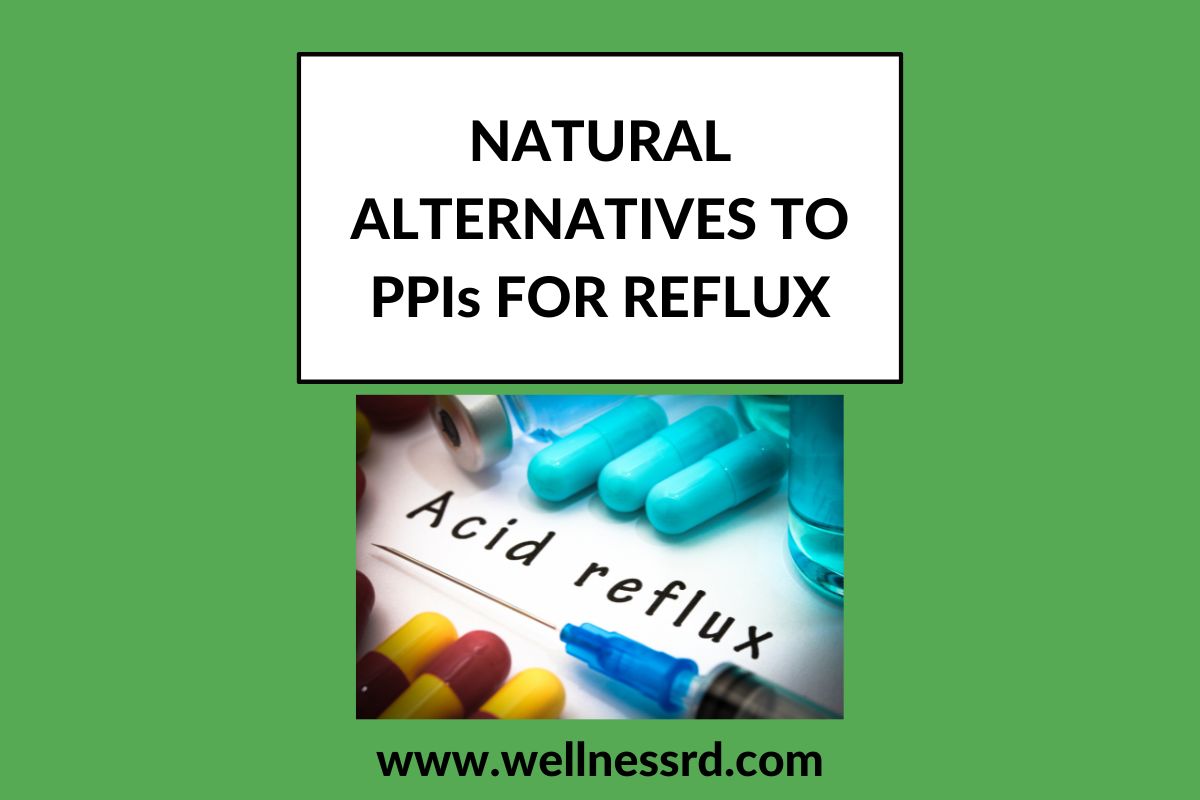
Table of Contents
What is Reflux or GERD?
Gastroesophageal Reflux (GERD) is a common disorder where acid from the stomach moves up into your esophagus causing a burning sensation. If you are having symptoms like this (known as heartburn) two or more times per week, it may mean you have reflux according to the American College of Gastroenterology (1).
Research shows about 20% of the US population has GERD (2).
Physicians diagnose GERD with a GI series, an endoscopy, a pH test, or a history and physical alone (3).
PPIs are often prescribed by your healthcare professional for reflux. Most guidelines recommend a short-term course of 4-8 weeks then, PPIs may be tapered (4). ALWAYS check with your healthcare professional about your PPI use.
Long term use of PPIs may contribute to nutrient deficiencies of magnesium, vitamin C, B12, iron, and calcium so check in with your nutrition professional if you take PPIs (5).
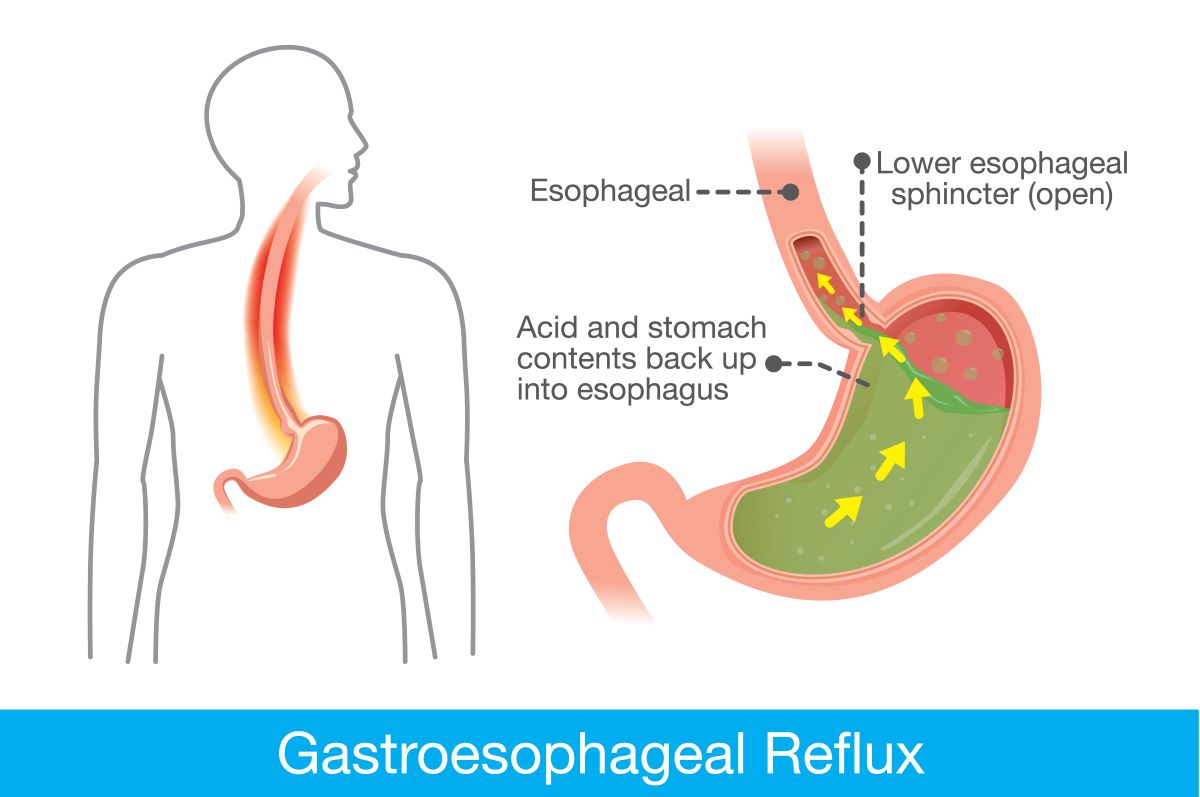
What are the Symptoms of Reflux?
Common symptoms of reflux include (6):
- Heartburn
- Difficulty swallowing
- Feeling of a lump in your throat
- Chest pain
- Burping
If left untreated, complications may occur including a potential risk of esophageal cancer (7).
What are Some Causes of Reflux?
Reflux occurs when your stomach acid flows up into the esophagus. There are barriers to prevent the up flow of acid like a flap at the top of the esophagus, muscles, and gravity in your esophagus. Sometimes, these barriers break down by poor diet, lifestyle, or physical changes.
Some of the main causes of GERD may be the Western diet, obesity, and Helicobacter pylori (H. pylori) (8). H. pylori can be tested for stomach discomfort, indigestion, or reflux symptoms (9).
If H. pylori is confirmed often by urea breath test, treatment may be antibiotics or natural alternatives recommended by your healthcare professional.
What are Some Natural Alternatives to PPIs for Reflux?
Best Foods to Prevent Reflux
Reflux and Diet
Some of the foods that may contribute to your reflux include coffee, chocolate, spicy foods, alcohol, tomato products, citrus, carbonated beverages, mint, and fatty foods. The Mediterranean diet with anti-inflammatory foods can reduce symptoms (10, 11, 12). See link at the end of the article.
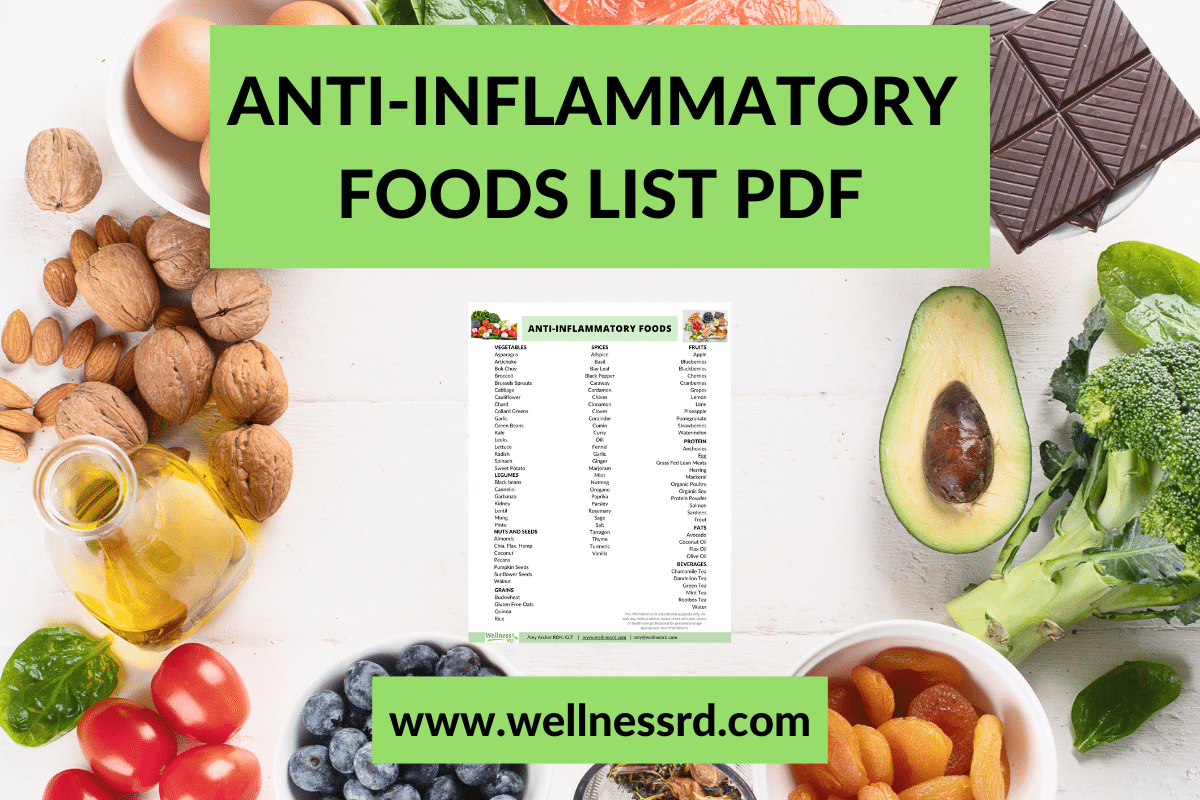
Mediator Release Test (MRT) to Reduce Inflammation
Elimination diets can provide relief from your reflux when guided by a healthcare professional (13, 14).
The MRT is a blood test that measures your body’s inflammatory response to 176 foods and chemicals. From the MRT, we create a personalized anti-inflammatory diet protocol called LEAP to reduce symptoms. In my practice, hundreds of clients have reduced reflux symptoms with the MRT, the LEAP protocol, and alternative treatments. Make sure you talk to a nutrition professional when following an elimination diet. With MRT, find a Certified LEAP Therapist (CLT).
Reducing Constipation for Reflux Relief
Constipation can worsen GERD symptoms so address why your bowels are not moving (15, 16). There are many ways to reduce constipation naturally here.
Nutrition Guidelines for Reflux
- How you eat is important to feel your best.
- Eat small frequent meals, avoiding a large meal especially before bedtime.
- Do not eat for 2 hours prior to bed and avoid lying down for 2 hours after eating.
- Losing weight can help reduce your reflux.
Natural Alternatives to PPIs: Supplements
There are many natural alternative supplements which have been studied to relieve reflux symptoms (17, 18).
Aloe Vera
Aloe vera has anti-inflammatory properties and can help to soothe your esophagus, stomach, and intestinal tract. A pilot study in 2015 with aloe vera gel at 10mL/day resulted in a reduction in GERD symptoms over a 4-week period (19). Choose decolorized aloe vera which has been purified as a safe alternative for reflux symptoms.
Probiotics
Probiotics are foods or supplements that have live bacteria and/or yeast and they have shown to restore the balance of your gut bacteria and improve gut health. A probiotic with Lactobacillus reuteri DSM 17938 showed a reduction of dysbiosis (imbalance of gut bacteria) with children who took PPIs (20). If you have constipation as a symptom, reducing constipation may help with reflux symptoms as well. Ask your healthcare practitioner for a probiotic that helps with constipation.
Ginger
Ginger root is a flowering plant that has been used for nausea and reflux. It has anti-inflammatory properties that can reduce inflammation, improve gut motility, and stomach emptying (21). Ginger capsules, chews, and teas are available.
Apple Cider Vinegar
Reflux may be caused by too little stomach acid and ACV is thought to increase stomach acid. It is also antibacterial and can fight against bacteria and other foreign invaders. Apple cider vinegar (ACV) may improve digestion and reflux although more research is needed. Always dilute ACV with water and sip through a straw to avoid contact with the enamel on your teeth.
Licorice
Deglycyrrhizinated licorice (DGL) has been used for many years in functional medicine for gut inflammation (22). With its anti-inflammatory and anti-ulcer properties, it soothes the lining of the stomach. In a small randomized, double blind study, licorice extract reduced reflux symptoms significantly (23). DGL chewables should be taken about 20 minutes before meals to relieve symptoms.
Slippery Elm
The inner bark of the slippery elm tree contains a fibrous compound called mucilage that people use for acid reflux to soothe the lining of the digestive tract. Slippery elm is anti-inflammatory and can help to coat the gut and reduce reflux (24).
Marshmallow Root
Marshmallow is an herb that is a mucilage, and it is used often in Europe to treat coughs and mucous irritation. An in vitro study with marshmallow root showed decreased mucous membrane irritation suggesting it creates a protective layer in the gut (25).
Magnesium
Magnesium is the miracle mineral involved in over 600 pathways in the body (26). It plays a major role in muscle contraction allowing the stomach to empty better, which decreases the pressure on the upper sphincter in the esophagus. A study found magnesium supplements decreased reflux symptoms and should be added to a treatment protocol (27). It also neutralizes stomach acid which can help to reduce symptoms.
Optimize your magnesium levels with supplements like magnesium glycinate, citrate, malate, or threonate.
Zinc Carnosine
Zinc carnosine is a supplement containing L-carnosine and zinc. Some of the benefits of zinc carnosine include restoring leaky gut, reducing H. pylori, less gastric ulcers, improving the gut lining, and healing the mucous in the gut (28). With all these benefits no wonder zinc carnosine has a positive effect on reflux.
Iberogast
Iberogast is an herbal blend supplement which contains bitter candytuft, angelica root, chamomile flower, caraway, milk thistle, lemon balm leaf, peppermint, greater celandine herb, and licorice root (29). Studies show Iberogast is effective for indigestion, irritable bowel syndrome, gut motility, and reflux (30, 31, 32, 33).
Melatonin
Most people know about melatonin, a hormone, which helps to regulate the sleep-wake cycle. It also protects the gut with its anti-inflammatory effects and by regulating gut motility (34). Studies find melatonin helps with sleep and gut health!
Alginates
Alginates are derived from seaweed which form into a gel in the presence of acid. They create a barrier for the gut and alginate studies found a reduction in reflux symptoms (35).
A randomized controlled study in 2022 resulted in reduced symptoms of reflux after alginate treatment for LPR (laryngopharyngeal reflux- when reflux is in the throat) (36).
Prokinetics for Gastroparesis
Poor gut motility is thought to be a contributor to gut disorders including reflux. Some herbal prokinetics like ginger, artichoke, and licorice which increase gut motility may be beneficial to reduce your reflux (37, 38).
Always talk to your healthcare professional prior to starting any supplements.
Natural Alternatives to PPIs: Lifestyle
The American Gastroenterological Association recommends weight management, dietary and lifestyle interventions, relaxation strategies, behavioral therapy with hypnotherapy, diaphragmatic, and deep breathing exercises as part of their practice update in 2022 (39).
Some of these lifestyle recommendations are:
- Raise the head of the bed by elevating your head about 6-10 inches with a foam wedge.
- Avoid wearing clothing that is too tight.
- Quit smoking and limit alcohol. Both of these can loosen the muscles around the esophagus and contribute to acid reflux.
- Exercise to help you lose weight.
Sleep
Lack of sleep can affect your melatonin levels and your gut lining. Studies find poor sleep quality correlates with an increase in reflux symptoms (40). Tips to increase your sleep quality include:
- Keep a regular sleep schedule
- Sleep in a dark room
- Try blue light blocking glasses
- Avoid eating 2-3 hours prior to sleep
- Eliminate electronic use at least one hour prior to bedtime
Acupuncture
Acupuncture uses fine needles in Traditional Chinese medicine to balance your body’s energy. A randomized controlled trial in 2016 resulted in GERD symptom reduction from acupuncture (41). Including acupuncture may be an important part of your integrative approach to reduce reflux (42).
Mindfulness
Your gut and brain are connected via the vagus nerve therefore, your brain health is important for your gut health and vice versa. Stress may increase your reflux symptoms so it is important to include mind-body techniques to help you heal your gut (43, 44). Mindfulness activities recommended include meditation, guided imagery, biofeedback, hypnosis, self compassion, and yoga as ways to decrease stress (45).
You may also be interested in my Happy Belly Tips to improve digestion.

Final Thoughts
Gastroesophageal Reflux (GERD) is a common disorder where acid from the stomach moves up into your esophagus causing a burning sensation.
Symptoms of reflux include a burning sensation, burping, difficulty swallowing, and burping.
Causes of reflux may be poor diet, lifestyle, and even H. Pylori. Being overweight can contribute to symptoms.
Certain foods can aggravate reflux so try an elimination diet with the help of a nutrition professional.
Here is an anti-inflammatory food list PDF.
Supplements which may help reduce your symptoms include aloe vera, probiotics, ginger, apple cider vinegar, DGL, slippery elm, marshmallow root, magnesium, zinc carnosine, Iberogast, alginates, and prokinetics.
Some lifestyle recommendations include improving sleep, acupuncture, and mindfulness.
Test don’t guess.
Read the blog.
© Amy Archer RDN, CLT, CHWC

